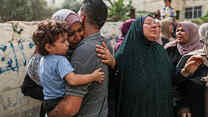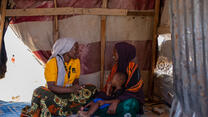The IRC's Client Voice and Choice initiative and Ground Truth Solutions are piloting an approach to better understand and strengthen how humanitarian assistance incorporates the preferences, aspirations, and expectations of the people at the focus of aid. This document details the methodology and findings of the pilot examining the southern Syria–Jordan cross-border health program.
The program objective is to provide immediate healthcare assistance to conflict-affected communities in southern Syria and support the reestablishment of health services in partnership with Syrian non-governmental organizations and civil society groups. The program provides health facilities in southern Syria with medical supplies, equipment, and medicine, and also provides staff incentives and operational costs, including fuel, to facilities through partner organizations.
Program services are available to everyone who needs them; clients are those people who come to the health facility to access services. While health facility staff (SAMS) may also, in some ways, be considered clients since partner perspectives are of equal importance to the IRC, for the purpose of this pilot only the users of the health facility were surveyed.
The program is funded by USAID’s Office of U.S. Foreign Disaster Assistance and the UK Department for International Development.
Summary of Key Learning from Pilots
- Strengthen capacity for conducting surveys and facilitating focus group discussions. The Jordan cross- border team have no direct access to clients inside Syria, and instead work through a team of research and monitoring and health assistants based in Syria. These staff received basic training to perform the monitoring and evaluation functions, but required additional training to facilitate dialogue sessions as part of the Ground Truth approach. Although this training initially required time and effort to conduct, resulting in some delays between survey Rounds 1 and 2, these staff now have improved capacity for undertaking similar exercises in the future. Program teams should consider when and how to accommodate the necessary upfront investments in strengthening the capacity of staff and partners for implementing the client feedback loop.
- Integrate the client feedback loop into the program design from the outset to improve buy-in and ownership. There was reluctance among some program team members hosting the pilot to devote time and attention to implementing each stage of the Ground Truth cycle. The IRC’s Client Voice and Choice (CVC) team and Ground Truth explained the rationale behind the methodology and sought to ensure that the client feedback loop was designed to accommodate the constraints faced by the program team and addressed their needs. However, client responsiveness often competes with other program team priorities. The pilot was tested in addition to and alongside routine program implementation and monitoring and evaluation practices. To alleviate this challenge would have involved integrating a feedback methodology into the program implementation plan and staff roles and responsibilities from the beginning. Additional efforts by humanitarian organizations in general are necessary to motivate and incentivize staff in the field to prioritize client responsive practices alongside other key priorities.
- Involve partners in the design and implementation of the feedback mechanism. The Jordan cross- border team partner SAMS was involved in the design of the client feedback mechanism and motivated and committed to client responsiveness. The Jordan team felt that SAMS could have been further involved. This underlies the importance of organizations working with partners together to be more client and partner responsive.
Next Steps and Recommendations from these Pilots
If the Jordan cross-border team and SAMS course correct in response to the feedback from clients, and continue to implement a feedback and response mechanism, over time they may see a positive improvement in the number of clients reporting that they believe that the health facility will act on their feedback. IRC’s SRR program teams are committed to introducing a region-wide programmatic feedback and complaints mechanism, to which the Jordan cross-border team will use. This bodes well for the sustainability of the program team’s efforts during the course of piloting the Ground Truth approach.


